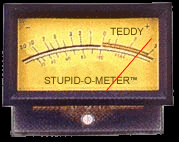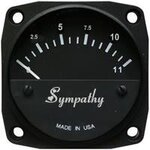EDDE
Gold Member
- Dec 7, 2004
- 7,129
- 65
- Detector(s) used
- Troy X5
- Primary Interest:
- All Treasure Hunting
Janella Spears

She doesn’t think she’s a sucker or an easy mark.
Besides her work as a registered nurse, Spears – no relation to thewell-known pop star – also teaches CPR and is a reverend who hasmarried many couples. She also communicates with lightning-fast signlanguage with her hearing-impaired husband.
So how did this otherwise lucid, intelligent woman end up sendingnearly half a million dollars to a bunch of con artists running whathas to be one of the best-known Internet scams in the world?
Spears fell victim to the "Nigerian scam," which is familiar to almost anyone who has ever had an e-mail account.
The e-mail pitch is familiar to most people by now: a long-lostrelative or desperate government official in a war-torn country needsto shuffle some funds around, say $10 million or $20 million, and ifyou could just help them out for a bit, you get to keep 10 (or 20 or30) percent for your trouble.
All you need to do is send X-amount of dollars to pay some fees andall that cash will suddenly land in your checking account, putting youon Easy Street. By the way, please send the funds though an untraceablewire service.
By this time, not many people will fall for such an outrageouspitch, and the scam is very well-known. But it persists, and for areason: every now and then, it works.
For Spears, it started, as it almost always does, with an e-mail. It promised $20 million and in this case, the money was supposedly leftbehind by her grandfather (J.B. Spears), with whom the family had lostcontact over the years.
"So that's what got me to believe it," she said.
Spears didn't know how the sender knew J.B. Spears' name and her relation to him, but her curiosity was piqued.
It turned out to be a lot of money up front, but it started with just $100.
The scammers ran Spears through the whole program. They saidPresident Bush and FBI Director "Robert Muller" (their spelling) werein on the deal and needed her help.
They sent official-looking documents and certificates from the Bankof Nigeria and even from the United Nations. Her payment was"guaranteed."
Then the amount she would get jumped up to $26.6 million – if she would just send $8,300. Spears sent the money.
More promises and teases of multi-millions followed, with each onedependent on her sending yet more money. Most of the missives were rifewith misspellings.
When Spears began to doubt the scam, she got letters from thePresident of Nigeria, FBI Director Mueller, and President Bush.Terrorists could get the money if she did not help, Bush’s letter said.Spears continued to send funds. All the letters were fake, of course.
She wiped out her husband’s retirement account, mortgaged the houseand took a lien out on the family car. Both were already paid for.
For more than two years, Spears sent tens and hundreds of thousandsof dollars. Everyone she knew, including law enforcement officials, herfamily and bank officials, told her to stop, that it was all a scam.She persisted.
Spears said she kept sending money because the scammers kept tellingher that the next payment would be the last one, that the big money wasinbound. Spears said she became obsessed with getting paid.
An undercover investigator who worked on the case said greed helpedblind Spears to the reality of the situation, which he called the worstexample of the scam he’s ever seen.
He also said he has seen people become obsessed with the scambefore. They are so desperate to recoup their losses with the bigpayout, they descend into a vicious cycle of sending money in hopes thefalse promises will turn out to be real.
Now, Spears has gone public with her story as a warning to others not to fall victim.
She hopes her story will warn others to listen to reason and avoidgoing down the dark tunnel of obsession that ended up costing her somuch.
Spears said it would take her at least three to four years to digout of the debt she ran up in pursuit of the non-existent pot ofNigerian gold.

She doesn’t think she’s a sucker or an easy mark.
Besides her work as a registered nurse, Spears – no relation to thewell-known pop star – also teaches CPR and is a reverend who hasmarried many couples. She also communicates with lightning-fast signlanguage with her hearing-impaired husband.
So how did this otherwise lucid, intelligent woman end up sendingnearly half a million dollars to a bunch of con artists running whathas to be one of the best-known Internet scams in the world?
Spears fell victim to the "Nigerian scam," which is familiar to almost anyone who has ever had an e-mail account.
The e-mail pitch is familiar to most people by now: a long-lostrelative or desperate government official in a war-torn country needsto shuffle some funds around, say $10 million or $20 million, and ifyou could just help them out for a bit, you get to keep 10 (or 20 or30) percent for your trouble.
All you need to do is send X-amount of dollars to pay some fees andall that cash will suddenly land in your checking account, putting youon Easy Street. By the way, please send the funds though an untraceablewire service.
By this time, not many people will fall for such an outrageouspitch, and the scam is very well-known. But it persists, and for areason: every now and then, it works.
For Spears, it started, as it almost always does, with an e-mail. It promised $20 million and in this case, the money was supposedly leftbehind by her grandfather (J.B. Spears), with whom the family had lostcontact over the years.
"So that's what got me to believe it," she said.
Spears didn't know how the sender knew J.B. Spears' name and her relation to him, but her curiosity was piqued.
It turned out to be a lot of money up front, but it started with just $100.
The scammers ran Spears through the whole program. They saidPresident Bush and FBI Director "Robert Muller" (their spelling) werein on the deal and needed her help.
They sent official-looking documents and certificates from the Bankof Nigeria and even from the United Nations. Her payment was"guaranteed."
Then the amount she would get jumped up to $26.6 million – if she would just send $8,300. Spears sent the money.
More promises and teases of multi-millions followed, with each onedependent on her sending yet more money. Most of the missives were rifewith misspellings.
When Spears began to doubt the scam, she got letters from thePresident of Nigeria, FBI Director Mueller, and President Bush.Terrorists could get the money if she did not help, Bush’s letter said.Spears continued to send funds. All the letters were fake, of course.
She wiped out her husband’s retirement account, mortgaged the houseand took a lien out on the family car. Both were already paid for.
For more than two years, Spears sent tens and hundreds of thousandsof dollars. Everyone she knew, including law enforcement officials, herfamily and bank officials, told her to stop, that it was all a scam.She persisted.
Spears said she kept sending money because the scammers kept tellingher that the next payment would be the last one, that the big money wasinbound. Spears said she became obsessed with getting paid.
An undercover investigator who worked on the case said greed helpedblind Spears to the reality of the situation, which he called the worstexample of the scam he’s ever seen.
He also said he has seen people become obsessed with the scambefore. They are so desperate to recoup their losses with the bigpayout, they descend into a vicious cycle of sending money in hopes thefalse promises will turn out to be real.
Now, Spears has gone public with her story as a warning to others not to fall victim.
She hopes her story will warn others to listen to reason and avoidgoing down the dark tunnel of obsession that ended up costing her somuch.
Spears said it would take her at least three to four years to digout of the debt she ran up in pursuit of the non-existent pot ofNigerian gold.


 :P
:P

 , cannot seem
, cannot seem








